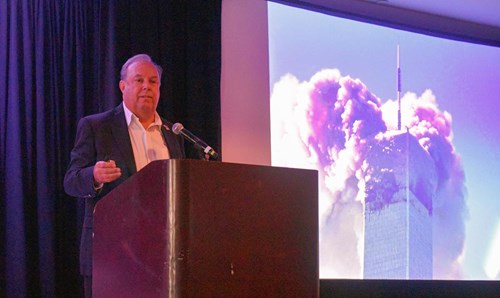Two years ago, RISE West had the honor of having Richard Picciotto, retired NYC fire department chief, present an amazing story of his survival and heroics during 9/11. As the nation commemorates the 20th anniversary of our darkest day, we look back on his inspiring keynote.

Richard Picciotto: A lesson in leadership from a true American hero
Richard Picciotto, retired NYC fire department chief, kicked off RISE West 2019 with a gripping first-hand account of his heroic efforts to evacuate thousands from the North Tower of the World Trade Center on September 11. His remarkable story was even more poignant as he recounted it on the day before the 18th anniversary of the terrorist attacks that killed nearly 3,000 people.
The highest-ranking firefighter to survive the World Trade Center collapse, Picciotto kept 450 attendees enthralled for an hour as he recalled his actions from the moment he first heard the call that the first plane hit the North Tower. He immediately rushed to the scene, as he knew the building well. He had evacuated the tower after the 1993 bombing and could quickly identify where the 99 elevators and three narrow stairwells were located.
As he made his way up 35 floors to rescue those trapped on the upper floors, he felt the South Tower collapse and he made the most difficult decision he made in his life: he ordered firefighters, rescue workers and civilians to evacuate the North Tower. It was a tough decision because he knew there was little hope now that the people trapped on the higher floors would survive. “We take risks. We risk our lives to save other peoples’ lives, but we take calculated risks…I thought I have to get everyone out of here,” he said.
As they headed back down the 36-inch stairwell, Picciotto stopped at each floor and swept the area to make sure no one was left behind. Twenty-nine minutes later he and the small crew of rescuers made it to the sixth floor when the North Tower collapsed, and as the floors fell, the force was like a tornado and it tossed them around like ragdolls. He thought they would die entombed in the debris.
“What do you do in the last few seconds of your life? I’ll tell you what I did. Your life flashes before you and I thought of my family, my wife and kids. For a lot of us, that is our lives…Then I prayed a compilation of every prayer I ever knew… And I prayed to God to make it quick because I didn’t want to suffer,” he recalled.
He remained trapped in the same void with 13 others for approximately five hours and it felt like an eternity. Picciotto ordered them not to move, because the void was like a house of cards. One movement could cause the pocket to collapse. Eventually the smoke shifted, and he saw a large gray spot that gradually became brighter and he decided to climb through the rubble toward the light. He emerged on the highest pile of wreckage in a 16-acre, debris-filled field that later became known as Ground Zero.
Despite the horror of that day and the devastating loss of life, Picciotto said he remembers how many people helped one another that day and how the event united the country. “Every person there, they were people like you, people who help people in need. They would say ‘I’m not going to leave Mary. I’m not leaving Charlie. We are going to get out of here together.’...It was tremendous to see people helping each other,” he said.
Reflecting on that horrible day, Picciotto said it was faith and hope that got him through it. “The American spirit is tremendous. Americans, we care for each other. The people in the building were helping each other. And this country is a giving country. After 9/11, a lot of widows lost their husbands, a lot of people supported them and paid for their kids’ education. We help those in need,” he said, noting that despite the political division in the U.S., people have more in common than they realize.
The experience also caused him to reprioritize his life. “I can tell you that during tragedies you become very focused on what’s important to your life. You get focused on family and friends. That’s what is important. That is what matters,” he said.
